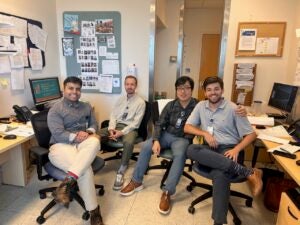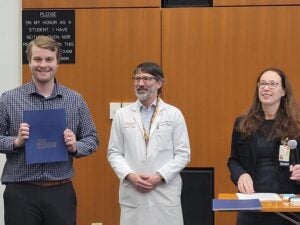General Psychiatry Residency

The General Psychiatry Residency Program at the University of Virginia is a 4-year training program accredited by the ACGME. We have a dedicated faculty and a variety of opportunities to customize your training experience. Each year, we seek to match a group of 11 well-rounded applicants from varied backgrounds and training who have exhibited an interest in psychiatry. Graduates have excellent board pass rates and go on to a variety of positions across the nation and internationally, including fellowships and careers in academics and private practice.
Mission Statement and Program Aims
The University of Virginia Psychiatry Residency Program aims to train physicians who give compassionate, evidence-based psychiatric care for patients of all ages and backgrounds. We want to empower our residents with not only the clinical knowledge, critical thinking skills, and passion for lifelong learning required for high quality patient care, but also with the confidence to manage our community’s resources in a way that fosters collaboration, kindness, and integrity. We encourage leadership within the department, medical center, and community to develop and prepare residents as leaders in all settings of practice.

Patient Care
- Provide the residents opportunities to care for patients with psychiatric illnesses in all areas of practice – outpatient, community, emergency department and the general hospital, as well as acute psychiatric and state hospitalization.
Medical Knowledge & Professionalism
- Provide core and elective rotations that drive the resident to learn the perspectives of different patient populations along the entire spectrum of psychiatric illnesses.
Interpersonal Skills
- Provide rotations that allow the residents to develop communication skills and resource management skills to become highly valued leaders of patient care within the medical system.
Systems Based Practice
- Encourage residents to assess their patients using a bio-psycho-social approach to craft multimodal treatment plans utilizing psychotherapeutic, pharmacologic, and socioeconomic resource management skills.
Practice Based Learning
- Expose residents to the rich research opportunities at UVA and to national conferences to encourage interest in growing the field and expanding personal knowledge.
- Develop teaching and presentation skills via multi-disciplinary opportunities within both the department and throughout the medical center to further expand medical knowledge and practice-based learning.
- Instill the skills and passion to utilize evidence-based practice, which encourages lifelong learning and leadership throughout their career.
Areas of Excellence
 Addiction Psychiatry: Residents are exposed to addiction psychiatry starting as a PGY-2 with clinical exposure that includes inpatient addiction medicine consultations and outpatient-based addiction clinic (OBAT). Residents work closely with the addiction medicine fellow while on the addiction medicine rotation. PGY-4’s can participate in addiction medicine electives to further their skills or work on research at the Center for Leading-Edge Addiction Research at UVA.
Addiction Psychiatry: Residents are exposed to addiction psychiatry starting as a PGY-2 with clinical exposure that includes inpatient addiction medicine consultations and outpatient-based addiction clinic (OBAT). Residents work closely with the addiction medicine fellow while on the addiction medicine rotation. PGY-4’s can participate in addiction medicine electives to further their skills or work on research at the Center for Leading-Edge Addiction Research at UVA.
Consultation-Liaison (CL) Psychiatry: A robust clinical experience and an integral part of resident training at UVA Psychiatry. PGY-1 and 2 residents spend several blocks on the CL service providing psychiatric care to the Emergency Department and Inpatient Services. Residents are exposed to a wide variety of pathology and are able to develop superior skills in managing acute psychiatric needs for those in crisis or those with complex medical issues. PGY-4’s have the opportunity to further their CL training or prepare for fellowship in CL with elective rotations on this service.
Women’s Mental Health: UVA psychiatry is fortunate to have two faculty members that are leaders in the field of Women’s Reproductive Mental Health; Dr. Anita Clayton and Dr. Jennifer Payne. Dr. Clayton’s research interests include sexual dysfunction/sexual disorders along with depressive disorders that are connected to the reproductive cycle while Dr. Payne has interest in the genetic, epigenetic and biologic basis of postpartum depression as well as pre-menstrual and peri-menopausal mood disorders. Dr. Payne is also the director of the Reproductive Psychiatry Research Program and works with the OBGYN department at UVA. Both faculty members provide educational and clinical support to residents in the realm of women’s mental health, thereby furthering the skill set of our trainees. PGY-4 residents can partake in electives within this unique subset of psychiatry.
Western State Hospital: UVA Psychiatry works closely with Virginia Community Service Boards as well as the local state hospital in Staunton, VA. Residents in the PGY-2 year rotate at Western State Hospital (WSH) working in a combination of short- and long-term psychiatric units to further develop inpatient skills. This unique opportunity provides residents with exposure to forensic psychiatry, severe mental illness and substance use disorders, among others. Residents are involved in the interdisciplinary approach to care at WSH and work closely with social workers, psychotherapists and psychiatrists in patient management. PGY-3 and 4 residents have the opportunity to moonlight at WSH.
Psychotherapy Training: Residents are encouraged to pursue psychotherapy throughout their 4 years of training. The foundation to psychotherapy is integrated into the PGY-1 didactic curriculum where our clinical psychology faculty provide skill development in the modalities of DBT, CBT and MI. Residents are encouraged to integrate these skills while on the CL and inpatient services. PGY-2s focus specifically on supportive psychotherapy skills and establish care with a small group of patients longitudinally over PGY-2 year. During the PGY-3 year, residents are encouraged to expand their therapy patient load, building further on CBT, DBT and supportive therapy techniques. The outpatient clinic also runs several psychotherapy groups which residents in the PGY-3 year partake. PGY-4 residents can further their psychotherapy skills with multiple elective opportunities while also continuing individual therapy with patients from prior years. All residents are provided with psychotherapy supervision with clinical faculty.
Global Mental Health Track: The program offers a Global Health Track in collaboration with the University of Virginia Center for Global Health that provides opportunities for residents to explore medicine and psychiatry in different areas of the US and the world. Residents can choose from a number of national and international sites for elective time and work on projects related to global health with our own faculty or other physicians and researchers at UVA.
